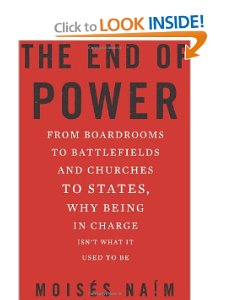The End of Power, by Moises Naim
Moises Naim presents a counterintuitive argument that centralized power is declining. This is the result of everything from globalization to the spread of democracy to individual empowerment through the web. And many other sources.
His book The End of Power: From Boardrooms to Battlefields and Churches to States, Why Being In Charge Isn’t What It Used to Be is well researched, carefully thought out, and fully documented. He makes a compelling case.
And when you think about it, we see this all the time. Arab Spring. Gridlock in Washington. Declining attendance in organized religions. A consumer society that demands faster response to needs/wants. Shorter CEO terms at large companies. Even the rise of terrorist cells and military insurrections.
Naturally we don’t feel like centralized power is changing. We feel Washington is too big, unions too powerful, the military too bloated, and threats around the world growing. But even if those are true (and I’m not suggesting they are, just conceding the point for the sake of argument), they don’t change the trend toward decentralization of power.
I don’t agree with all the details in the book. Naim does not do a good job with organized religion, focusing merely on the rise of Pentecostals in Latin America at the expense of the Catholic Church. But I can concede shortcuts when it comes to measuring power. This is a big topic and he can’t be expected to cover every situation with exhaustive research.
Naim points out these shifts will fundamentally alter how society operates. This will be, overall, great news for individual liberties. But also bad news for getting much done on a large scale. It’s going to take a different kind of leadership to navigate through a “vetocracy” where no one group or individual can chart a path forward.
I enjoyed this book and it confirmed a lot of things that now seem rather obvious to me. I think you’ll enjoy it too.


